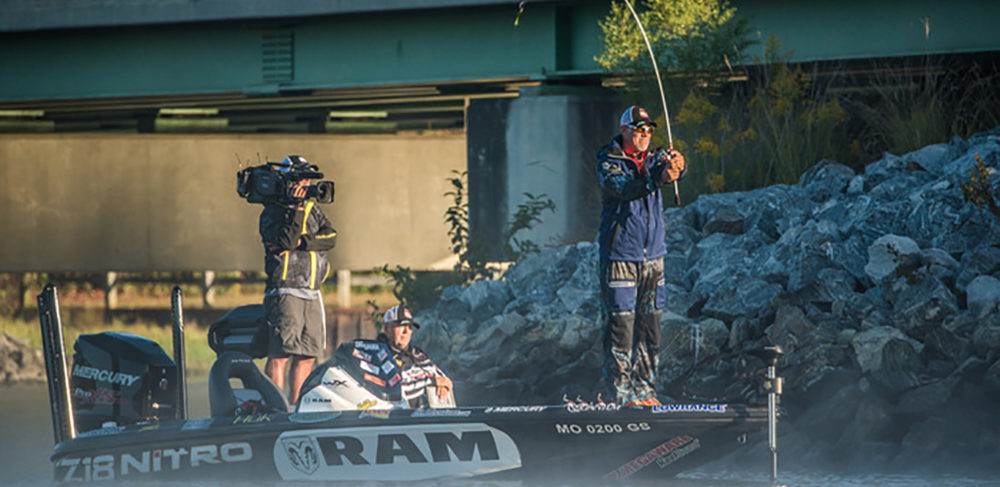Duckett Aims to Figure Things Out on the Fly

As Major League Fishing co-founder Boyd Duckett prepared to have his bass rig launched onto the waters of Lake Eufaula, I asked what he found to be the most stressful thing about MLF competition.
A competition just like the one unfolding this week deep as the MLF Challenge Cup is contested on the 45,181-acre border lake situated between Alabama and Georgia.
Does he find getting off to a dreaded slow start in the first period – as others light up the SCORETRACKER LIVE! leaderboard – to be more stressful?
Or does Duckett dread even more getting off to a good start, only to find himself behind the eight-ball as the day winds down in the third period?
Duckett said that he’s found himself becoming more and more comfortable with the first rather than the latter in recent MLF events.
“Early on, when I first started competing in these, you felt the urgency to stay up on the leaderboard (early in the day),” said Duckett, the 2007 Bassmaster Classic champ who lives in Guntersville, Ala.
“I’ve sort of gotten past that (now).”
As he has learned to fish the circuit along with everybody else, Duckett has noticed a subtle nuance developing over the years as he watches the MLF events unfold on Outdoor Channel programming.
“Guys have different talent levels (and skills out here), so everybody is having to find a way to survive this format,” said Duckett, who co-founded MLF along with Gary Klein.
“Early on in the day, it seems to be built for the high pace guy,” he added. “But that guy’s weaknesses might not show up (early in the day), (and that’s) the ability to grind (it out in) an area (to the very end).”
And the exact opposite is true as the grind it out guys can find themselves struggling at the end of the day if someone suddenly figures something out and starts to light up the leaderboard in the waning minutes.
The bottom line here is that in a lot of the past MLF events where a lot of fish are caught, Duckett said the high intensity, fast pace kind of anglers have tended to do well.
And in the events where just a few fish are caught and each single weighed bass is important and hard-earned, it’s the other guys who tend to do better, the methodical, grind it out kind of anglers.
That being said, Duckett pointed out that in the years since MLF’s competitive format began on southwestern Texas’ Lake Amistad, anglers from both extremes have been forced to learn and adapt.
Meaning that the fast pace guys have had to learn to slow down and grind things out on a smaller group of less active fish.
While the slower, more methodical guys have also been forced to adapt and fish at a faster pace to catch a few fish early on in the day so that they are able to stay in the game as the round unfolds.
“It’s been a change for a lot of guys,” said Duckett with a wry smile.
Ultimately, both angling styles come down to a MLF pro being able to find fish quickly and being able to capitalize on such opportunity once a few bass are found.
How does Duckett do that on a vast water body like Eufaula, launching out into the unknown each morning with a blank slate of bass catching opportunity in front of him?
For Duckett, fast paced action or slow, he’s had to realize that he can’t figure the whole lake or zone out in such a short period of time.
“Well, it’s just like it is for anyone going to any new lake,” said Duckett. “You can’t cover it all, so you’ve just got to get past the fact that you can’t cover all of the water.”
Duckett said that in seminars, people will often come up and ask how to figure out a vast water body like Florida’s Lake Okeechobee.
In his mind, less is often more, both in fun fishing on a new lake like the Big O and in the MLF brand of competition where the stakes are high.
“The truth is, at Okeechobee, you can’t learn it all in a week so you’ve got to make some educated decisions about what the fish should be doing in this part of the country at this time of year,” said Duckett, noting that it’s pretty much the same with MLF competition, even on often smaller lakes.
Meaning that MLF pros have to rely on past knowledge and experience, not to mention gut level instincts and angling intuition, ultimately making some solid choices that the day’s fishing proves to be right or wrong.
Once an angler is out on the water, the fish will quickly tell them if their educated guesses are right or wrong.
Whether the angler is able to listen to what the fish are saying – and adapt quickly enough – is another story.
“You’ve just got to find something similar to that initial idea you have, then dissect a specific area or a single creek (and see if you’re right), because you can’t cover it all,” said Duckett.
Even if you’re one of the best anglers to ever play the bass fishing game, just like Duckett is.